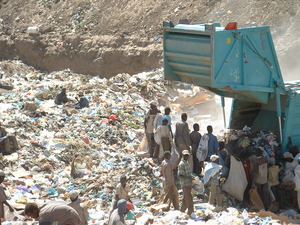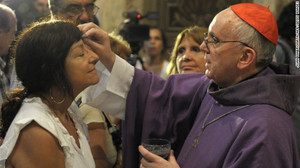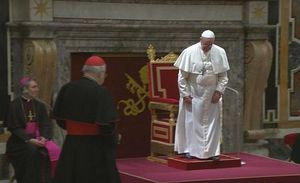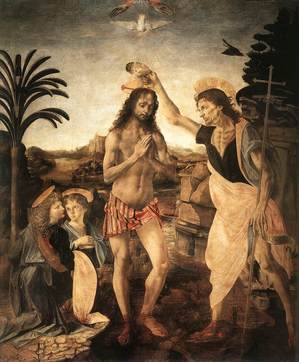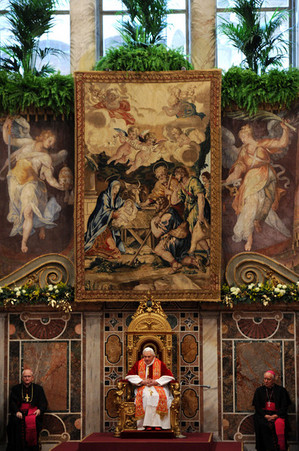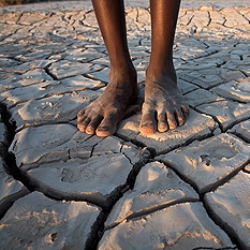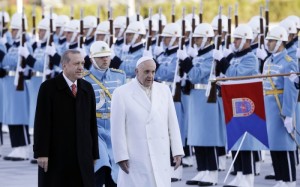 At work is the interface between Christian faith and public order with Pope Francis making a three day visit to Turkey. A new and concrete plan for peace is needed so that, as Francis says, conflict is not merely the daily and accepted way of life. There is nothing dignified about killing the person who thinks and prays differently from us. The Bishop of Rome calls the visit a “dialogue of friendship.” Nonetheless, his trip to this highly Islamic and fanatic country is going to be interesting in terms of relationships of peace, mutual charitable work and education the coming months (and years). Turkey has been seen as a secular country since Mustafa Kemal Ataturk (1881-1938) who is routinely said to be the founder of the Republic of Turkey and yet, history tells a different story. His republican views had no real place for religion in the marketplace –neither Christian nor Muslim.
At work is the interface between Christian faith and public order with Pope Francis making a three day visit to Turkey. A new and concrete plan for peace is needed so that, as Francis says, conflict is not merely the daily and accepted way of life. There is nothing dignified about killing the person who thinks and prays differently from us. The Bishop of Rome calls the visit a “dialogue of friendship.” Nonetheless, his trip to this highly Islamic and fanatic country is going to be interesting in terms of relationships of peace, mutual charitable work and education the coming months (and years). Turkey has been seen as a secular country since Mustafa Kemal Ataturk (1881-1938) who is routinely said to be the founder of the Republic of Turkey and yet, history tells a different story. His republican views had no real place for religion in the marketplace –neither Christian nor Muslim.
Today, many take it for granted that Turkey is an Islamic country with no Christian roots. Just the opposite, Turkey was a significant home of Christians (see the initial comments of Pope Francis below).
Pope Francis is not the first Roman Pontiff to visit Turkey; all of the recent pontiffs made a visit to the land of Christians. Recall, too, that Constantinople –the historic name of the current capitol of Turkey called Istanbul — is the home of Ecumenical Patriarch Bartholomew, successor of Saint Andrew and the spiritual father of nearly 300 million Orthodox Christians.
In some ways the Pope was restrained yet clear in his message of the need for a rule of law with various freedoms and rights for ALL peoples AND that the protection of all creation is required for peace. At the moment not everyone in Turkey can claim to be equal, free, and peaceful under the current practice of law.
The Pope’s address at to the leaders of Turkey:
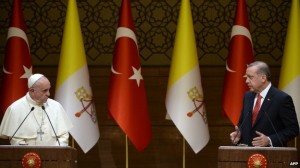 I am pleased to visit your country so rich in natural beauty and history, and filled with vestiges of ancient civilizations. It is a natural bridge between two continents and diverse cultures. This land is precious to every Christian for being the birthplace of St Paul, who founded various Christian communities here, and for hosting the first seven Councils of the Church. It is also renowned for the site near Ephesus which a venerable tradition holds to be the “Home of Mary”, the place where the Mother of Jesus lived for some years. It is now a place of devotion for innumerable pilgrims from all over the world, not only for Christians, but also for Muslims.
I am pleased to visit your country so rich in natural beauty and history, and filled with vestiges of ancient civilizations. It is a natural bridge between two continents and diverse cultures. This land is precious to every Christian for being the birthplace of St Paul, who founded various Christian communities here, and for hosting the first seven Councils of the Church. It is also renowned for the site near Ephesus which a venerable tradition holds to be the “Home of Mary”, the place where the Mother of Jesus lived for some years. It is now a place of devotion for innumerable pilgrims from all over the world, not only for Christians, but also for Muslims.
Yet, the reasons why Turkey is held with such regard and appreciation are not only linked to its past and ancient monuments, but also have to do with the vitality of its present, the hard work and generosity of its people, and its role in the concert of nations.
It brings me great joy to have this opportunity to pursue with you a dialogue of friendship, esteem and respect, in the footsteps of my predecessors Blessed Paul VI, Saint John Paul II and Benedict XVI. This dialogue was prepared for and supported by the work of the then Apostolic Delegate, Angelo Giuseppe Roncalli, who went on to become Saint John XXIII, and by the Second Vatican Council.
Today what is needed is a dialogue which can deepen the understanding and appreciation of the many things which we hold in common. Such a dialogue will allow us to reflect sensibly and serenely on our differences, and to learn from them.
There is a need to move forward patiently in the task of building a lasting peace, one founded on respect for the fundamental rights and duties rooted in the dignity of each person. In this way, we can overcome prejudices and unwarranted fears, leaving room for respect, encounter, and the release of more positive energies for the good of all.
To this end, it is essential that all citizens – Muslim, Jewish and Christian – both in the provision and practice of the law, enjoy the same rights and respect the same duties. They will then find it easier to see each other as brothers and sisters who are traveling the same path, seeking always to reject misunderstandings while promoting cooperation and concord. Freedom of religion and freedom of expression, when truly guaranteed to each person, will help friendship to flourish and thus become an eloquent sign of peace.
The Middle East, Europe and the world all await this maturing of friendship. The Middle East, in particular, has for too long been a theatre of fratricidal wars, one born of the other, as if the only possible response to war and violence must be new wars and further acts of violence.
How much longer must the Middle East suffer the consequences of this lack of peace? We must not resign ourselves to ongoing conflicts as if the situation can never change for the better! With the help of God, we can and we must renew the courage of peace! Such courage will lead to a just, patient and determined use of all available means of negotiation, and in this way achieve the concrete goals of peace and sustainable development.
Mr President, inter-religious and inter-cultural dialogue can make an important contribution to attaining this lofty and urgent goal, so that there will be an end to all forms of fundamentalism and terrorism which gravely demean the dignity of every man and woman and exploit religion.
Fanaticism and fundamentalism, as well as irrational fears which foster misunderstanding and discrimination, need to be countered by the solidarity of all believers. This solidarity must rest on the following pillars: respect for human life and for religious freedom, that is the freedom to worship and to live according to the moral teachings of one’s religion; commitment to ensuring what each person requires for a dignified life; and care for the natural environment. The peoples and the states of the Middle East stand in urgent need of such solidarity, so that they can “reverse the trend” and successfully advance a peace process, repudiating war and violence and pursuing dialogue, the rule of law, and justice.
Sadly, to date, we are still witnessing grave conflicts. In Syria and Iraq, particularly, terrorist violence shows no signs of abating. Prisoners and entire ethnic populations are experiencing the violation of the most basic humanitarian laws. Grave persecutions have taken place in the past and still continue today to the detriment of minorities, especially – though not only – Christians and Yazidis. Hundreds of thousands of persons have been forced to abandon their homes and countries in order to survive and remain faithful to their religious beliefs.
Turkey, which has generously welcomed a great number of refugees, is directly affected by this tragic situation on its borders; the international community has the moral obligation to assist Turkey in taking care of these refugees. In addition to providing much needed assistance and humanitarian aid, we cannot remain indifferent to the causes of these tragedies. In reaffirming that it is licit, while always respecting international law, to stop an unjust aggressor, I wish to reiterate, moreover, that the problem cannot be resolved solely through a military response.
What is required is a concerted commitment on the part of all, based on mutual trust, which can pave the way to lasting peace, and enable resources to be directed, not to weaponry, but to the other noble battles worthy of man: the fight against hunger and sickness, the promotion of sustainable development and the protection of creation, and the relief of the many forms of poverty and marginalization of which there is no shortage in the world today.
Turkey, by virtue of its history, geographical position and regional influence, has a great responsibility: the choices which Turkey makes and its example are especially significant and can be of considerable help in promoting an encounter of civilizations and in identifying viable paths of peace and authentic progress.
May the Most High bless and protect Turkey, and help the nation to be a strong and fervent peacemaker!
